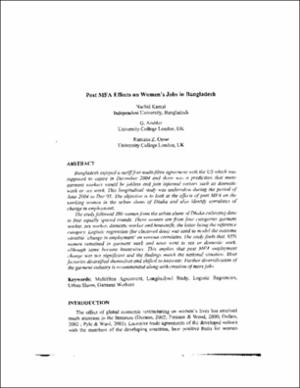| dc.description.abstract | Bangladesh Enjoyed a tariff free multi-fiber agreement with the US which was supposed to expire in December 2004 and there was a prediction that many garment workers would be jobless and join informal sex workers such as domestic work or sex work. This longitudinal study was undertaken during the period of June 2004 to Dec '05. The objective is to look at the effects of post MFA on the working women in the urban slums of Dhaka and also identify correlates of change in employment.
The study followed 300 women from the urban slums of Dhaka collecting data in four equally spaced rounds. These women are from four categories garment worker, sex worker, domestic worker and housewife, the latter being the reference category. Logistic regression (for clustered data) was used to model the outcome variable 'change in employment' on various correlates. The study finds that, 95% women remained in garment work and none went to sex or domestic work, although some became housewives. This implies that post MFA employment change was not significant and the findings match the national situation. Most factories diversified themselves and shifted to knitwear. Further diversification of the garment industry is recommended along with creation of more jobs. | en_US |
